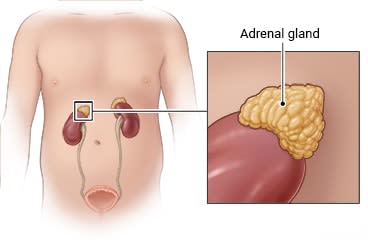
What is an adrenalectomy?
Adrenalectomy is surgery to remove all or part of one or both adrenal glands. The glands are above the kidneys. They make hormones that affect nearly every organ in the body. These hormones include adrenaline and cortisol. They do many things in the body. For example, they help control blood pressure. They help the body deal with stress. And they control the breakdown of fats and proteins in the liver.
This surgery may be done to remove a tumor that is or isn't cancer. It also may be done for people with Cushing's syndrome, a problem that causes too much cortisol in the body. It may be done to remove a tumor that makes too much adrenaline.
The surgery may be done through a single cut (incision). This is called open surgery. Or your child may have laparoscopic surgery. To do this, the doctor puts a lighted tube, or scope, and other tools through several small cuts.
If your child has laparoscopic surgery, your child may be able to leave the hospital the next day. With open surgery, your child may stay in the hospital for a few days or longer.
It may be a few weeks or more before your child can return to their normal activities.
How do you prepare for surgery?
Surgery can be stressful for both your child and you. This information will help you understand what you can expect. And it will help you safely prepare for your child's surgery.
 Preparing for surgery
Preparing for surgery
- Talk to your child about the surgery and what will happen. Hospitals know how to take care of children. The staff will do all they can to make it easier for your child.
- Ask if a special tour of the surgery area and hospital is available. This may make your child feel less nervous about what happens.
- Plan for your child's recovery time. Your child may need more of your time right after the surgery, both for care and for comfort.
- Understand exactly what surgery is planned, along with the risks, benefits, and other options.
- Tell the doctor ALL the medicines, vitamins, supplements, and herbal remedies your child takes. Some may increase the risk of problems during the procedure. Your doctor will tell you if your child should stop taking any of them before the procedure and how soon to do it.
The day before surgery
- A nurse may call you (or you may need to call the hospital). This is to confirm the time and date of your child's surgery and answer any questions.
- Remember to follow your doctor's instructions about your child taking or stopping medicines before surgery. This includes over-the-counter medicines.
What happens on the day of surgery?
- Follow the instructions exactly about when your child should stop eating and drinking. If you don't, the procedure may be canceled. If your doctor told you to have your child take any medicines on the day of the procedure, have your child take them with only a sip of water.
- Follow the doctor's instructions about when your child should bathe or shower before the surgery. Do not apply lotion or deodorant.
- Your child may brush their teeth. But tell your child not to swallow any toothpaste or water.
- Do not let your child wear contact lenses. Bring your child's glasses or contact lens case.
- Be sure your child has something that's a reminder of home. A special stuffed animal, toy, or blanket may be comforting. For an older child, it might be a book or music.
At the hospital or surgery center
- A parent or legal guardian must accompany your child.
- Your child will be kept comfortable and safe by the anesthesia provider. Your child will be asleep during the surgery.
- The surgery will take from 1 hour to a few hours.
- After surgery, your child will be taken to the recovery room. As your child wakes up, the recovery staff will monitor your child's condition. The doctor will talk to you about the surgery.
- You will probably be able to take your child home the day after a laparoscopic surgery. For open surgery, the hospital stay will be longer.
When should you call your doctor?
- You have questions or concerns.
- You don't understand how to prepare your child for surgery.
- Your child becomes ill before the surgery (such as fever, flu, or a cold).
- You need to reschedule or have changed your mind about your child having the surgery.
Where can you learn more?
Go to http://www.healthwise.net/patientEd
Enter A238 in the search box to learn more about "Adrenalectomy: Before Your Child's Surgery".
Current as of: October 27, 2024
Author: Ignite Healthwise, LLC Staff
Clinical Review Board
All Ignite Healthwise, LLC education is reviewed by a team that includes physicians, nurses, advanced practitioners, registered dieticians, and other healthcare professionals.

